Analyzing Policy & Politics in Nursing: The Impact of Safe Staffing
VerifiedAdded on 2021/04/21
|19
|5187
|122
Essay
AI Summary
This essay critically analyzes the current issues surrounding safe staffing levels in nursing within the NHS, focusing on the interplay of health policy and politics. It examines the problem of understaffing, its impact on patient care, and the government's response, referencing key reports like the Francis Report and organizations such as the Royal College of Nursing and UNISON. The essay explores the concept of safe staffing, the factors influencing policy development, and the impact of health staffing policy on service delivery, ultimately assessing whether policy implementation has improved health outcomes. It also considers the political, social, and economic contexts that shape policy development and implementation in nursing.
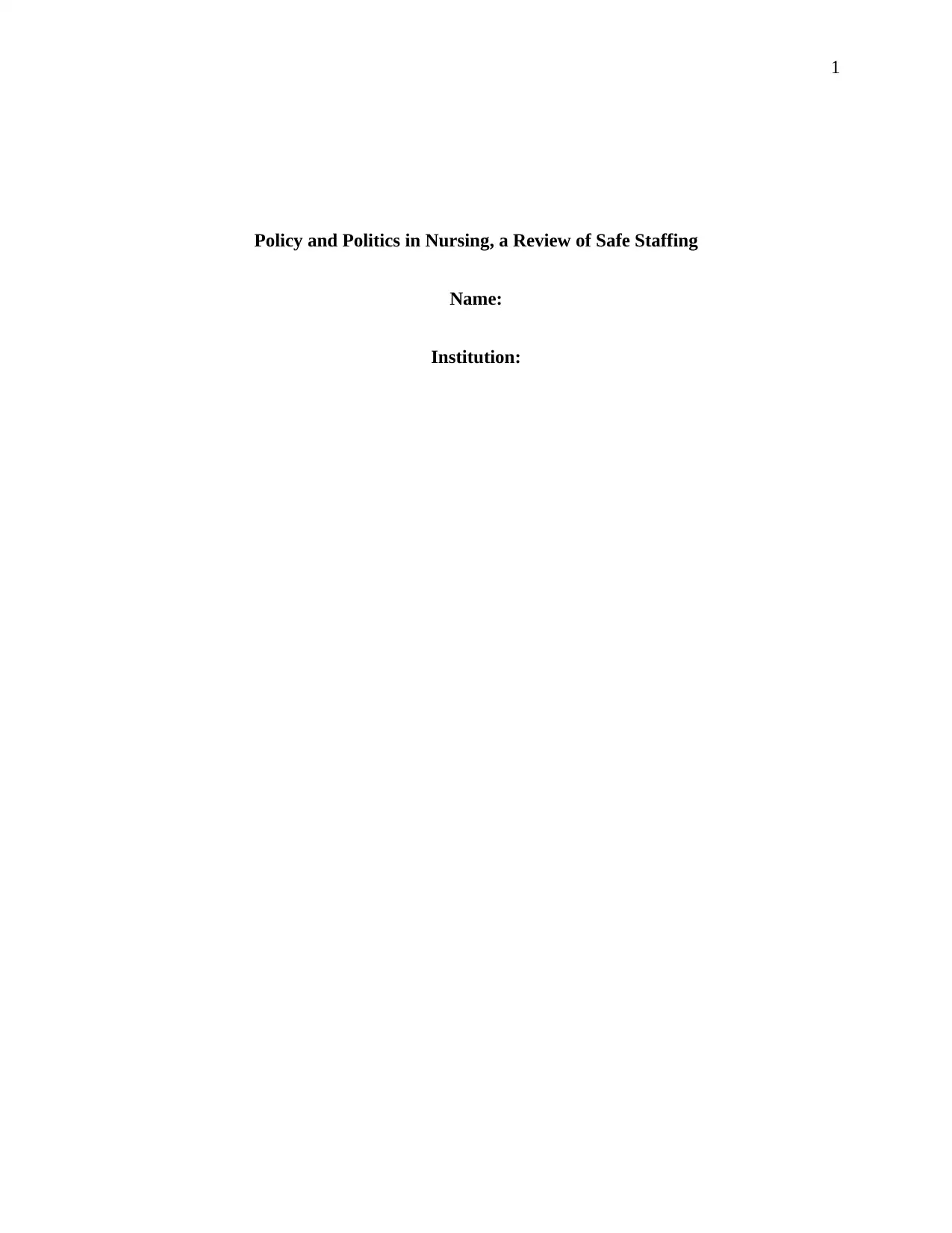
1
Policy and Politics in Nursing, a Review of Safe Staffing
Name:
Institution:
Policy and Politics in Nursing, a Review of Safe Staffing
Name:
Institution:
Paraphrase This Document
Need a fresh take? Get an instant paraphrase of this document with our AI Paraphraser
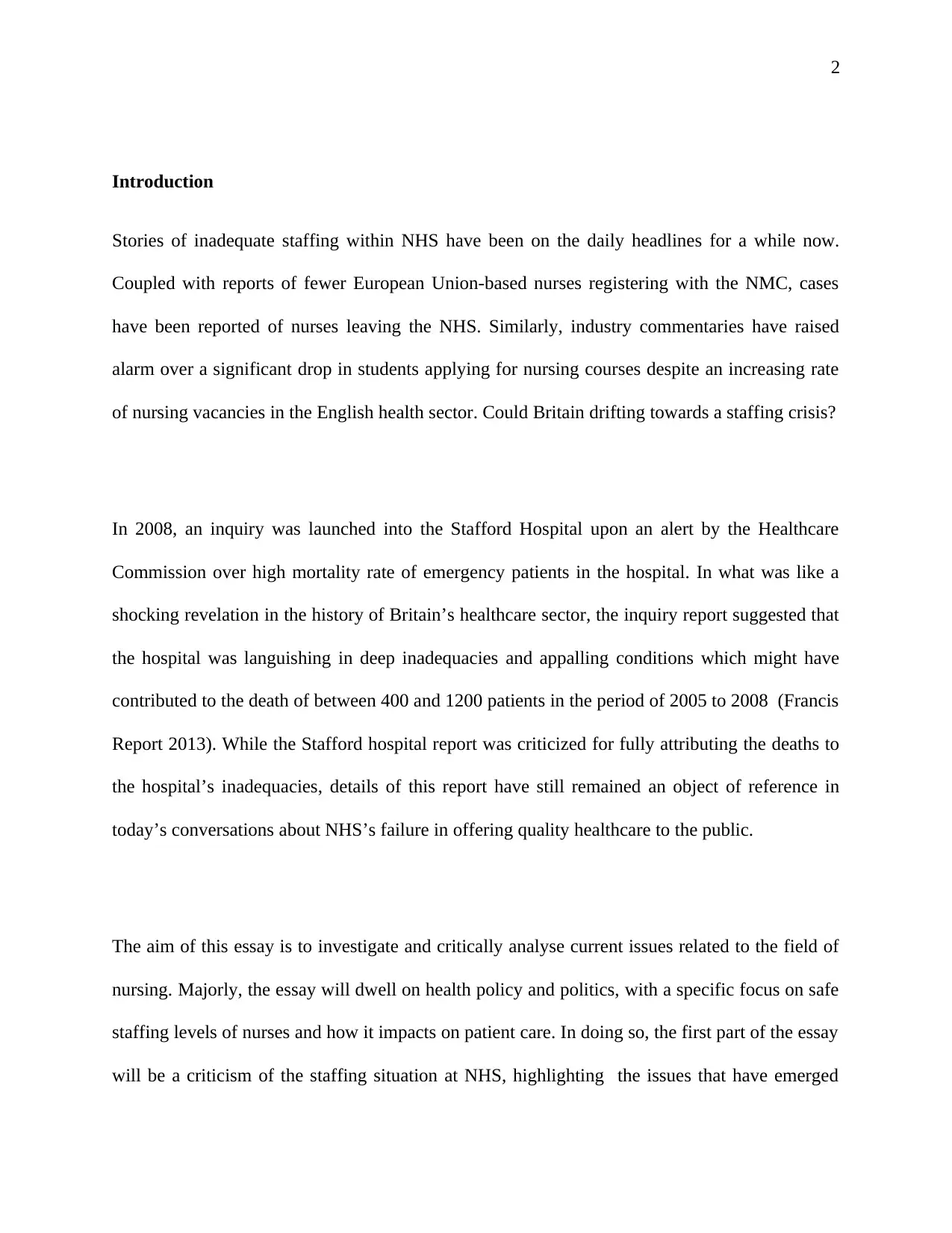
2
Introduction
Stories of inadequate staffing within NHS have been on the daily headlines for a while now.
Coupled with reports of fewer European Union-based nurses registering with the NMC, cases
have been reported of nurses leaving the NHS. Similarly, industry commentaries have raised
alarm over a significant drop in students applying for nursing courses despite an increasing rate
of nursing vacancies in the English health sector. Could Britain drifting towards a staffing crisis?
In 2008, an inquiry was launched into the Stafford Hospital upon an alert by the Healthcare
Commission over high mortality rate of emergency patients in the hospital. In what was like a
shocking revelation in the history of Britain’s healthcare sector, the inquiry report suggested that
the hospital was languishing in deep inadequacies and appalling conditions which might have
contributed to the death of between 400 and 1200 patients in the period of 2005 to 2008 (Francis
Report 2013). While the Stafford hospital report was criticized for fully attributing the deaths to
the hospital’s inadequacies, details of this report have still remained an object of reference in
today’s conversations about NHS’s failure in offering quality healthcare to the public.
The aim of this essay is to investigate and critically analyse current issues related to the field of
nursing. Majorly, the essay will dwell on health policy and politics, with a specific focus on safe
staffing levels of nurses and how it impacts on patient care. In doing so, the first part of the essay
will be a criticism of the staffing situation at NHS, highlighting the issues that have emerged
Introduction
Stories of inadequate staffing within NHS have been on the daily headlines for a while now.
Coupled with reports of fewer European Union-based nurses registering with the NMC, cases
have been reported of nurses leaving the NHS. Similarly, industry commentaries have raised
alarm over a significant drop in students applying for nursing courses despite an increasing rate
of nursing vacancies in the English health sector. Could Britain drifting towards a staffing crisis?
In 2008, an inquiry was launched into the Stafford Hospital upon an alert by the Healthcare
Commission over high mortality rate of emergency patients in the hospital. In what was like a
shocking revelation in the history of Britain’s healthcare sector, the inquiry report suggested that
the hospital was languishing in deep inadequacies and appalling conditions which might have
contributed to the death of between 400 and 1200 patients in the period of 2005 to 2008 (Francis
Report 2013). While the Stafford hospital report was criticized for fully attributing the deaths to
the hospital’s inadequacies, details of this report have still remained an object of reference in
today’s conversations about NHS’s failure in offering quality healthcare to the public.
The aim of this essay is to investigate and critically analyse current issues related to the field of
nursing. Majorly, the essay will dwell on health policy and politics, with a specific focus on safe
staffing levels of nurses and how it impacts on patient care. In doing so, the first part of the essay
will be a criticism of the staffing situation at NHS, highlighting the issues that have emerged
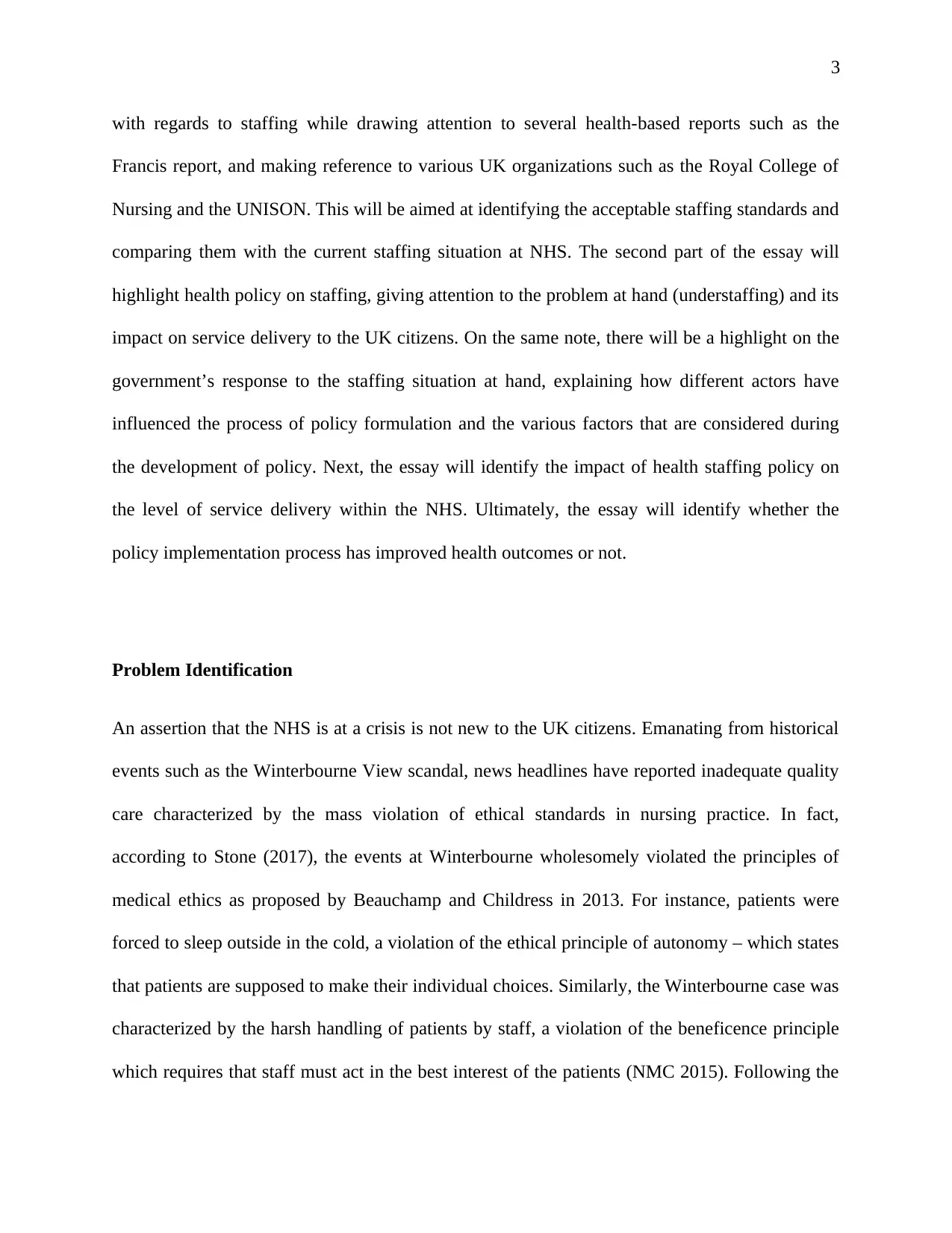
3
with regards to staffing while drawing attention to several health-based reports such as the
Francis report, and making reference to various UK organizations such as the Royal College of
Nursing and the UNISON. This will be aimed at identifying the acceptable staffing standards and
comparing them with the current staffing situation at NHS. The second part of the essay will
highlight health policy on staffing, giving attention to the problem at hand (understaffing) and its
impact on service delivery to the UK citizens. On the same note, there will be a highlight on the
government’s response to the staffing situation at hand, explaining how different actors have
influenced the process of policy formulation and the various factors that are considered during
the development of policy. Next, the essay will identify the impact of health staffing policy on
the level of service delivery within the NHS. Ultimately, the essay will identify whether the
policy implementation process has improved health outcomes or not.
Problem Identification
An assertion that the NHS is at a crisis is not new to the UK citizens. Emanating from historical
events such as the Winterbourne View scandal, news headlines have reported inadequate quality
care characterized by the mass violation of ethical standards in nursing practice. In fact,
according to Stone (2017), the events at Winterbourne wholesomely violated the principles of
medical ethics as proposed by Beauchamp and Childress in 2013. For instance, patients were
forced to sleep outside in the cold, a violation of the ethical principle of autonomy – which states
that patients are supposed to make their individual choices. Similarly, the Winterbourne case was
characterized by the harsh handling of patients by staff, a violation of the beneficence principle
which requires that staff must act in the best interest of the patients (NMC 2015). Following the
with regards to staffing while drawing attention to several health-based reports such as the
Francis report, and making reference to various UK organizations such as the Royal College of
Nursing and the UNISON. This will be aimed at identifying the acceptable staffing standards and
comparing them with the current staffing situation at NHS. The second part of the essay will
highlight health policy on staffing, giving attention to the problem at hand (understaffing) and its
impact on service delivery to the UK citizens. On the same note, there will be a highlight on the
government’s response to the staffing situation at hand, explaining how different actors have
influenced the process of policy formulation and the various factors that are considered during
the development of policy. Next, the essay will identify the impact of health staffing policy on
the level of service delivery within the NHS. Ultimately, the essay will identify whether the
policy implementation process has improved health outcomes or not.
Problem Identification
An assertion that the NHS is at a crisis is not new to the UK citizens. Emanating from historical
events such as the Winterbourne View scandal, news headlines have reported inadequate quality
care characterized by the mass violation of ethical standards in nursing practice. In fact,
according to Stone (2017), the events at Winterbourne wholesomely violated the principles of
medical ethics as proposed by Beauchamp and Childress in 2013. For instance, patients were
forced to sleep outside in the cold, a violation of the ethical principle of autonomy – which states
that patients are supposed to make their individual choices. Similarly, the Winterbourne case was
characterized by the harsh handling of patients by staff, a violation of the beneficence principle
which requires that staff must act in the best interest of the patients (NMC 2015). Following the
⊘ This is a preview!⊘
Do you want full access?
Subscribe today to unlock all pages.

Trusted by 1+ million students worldwide
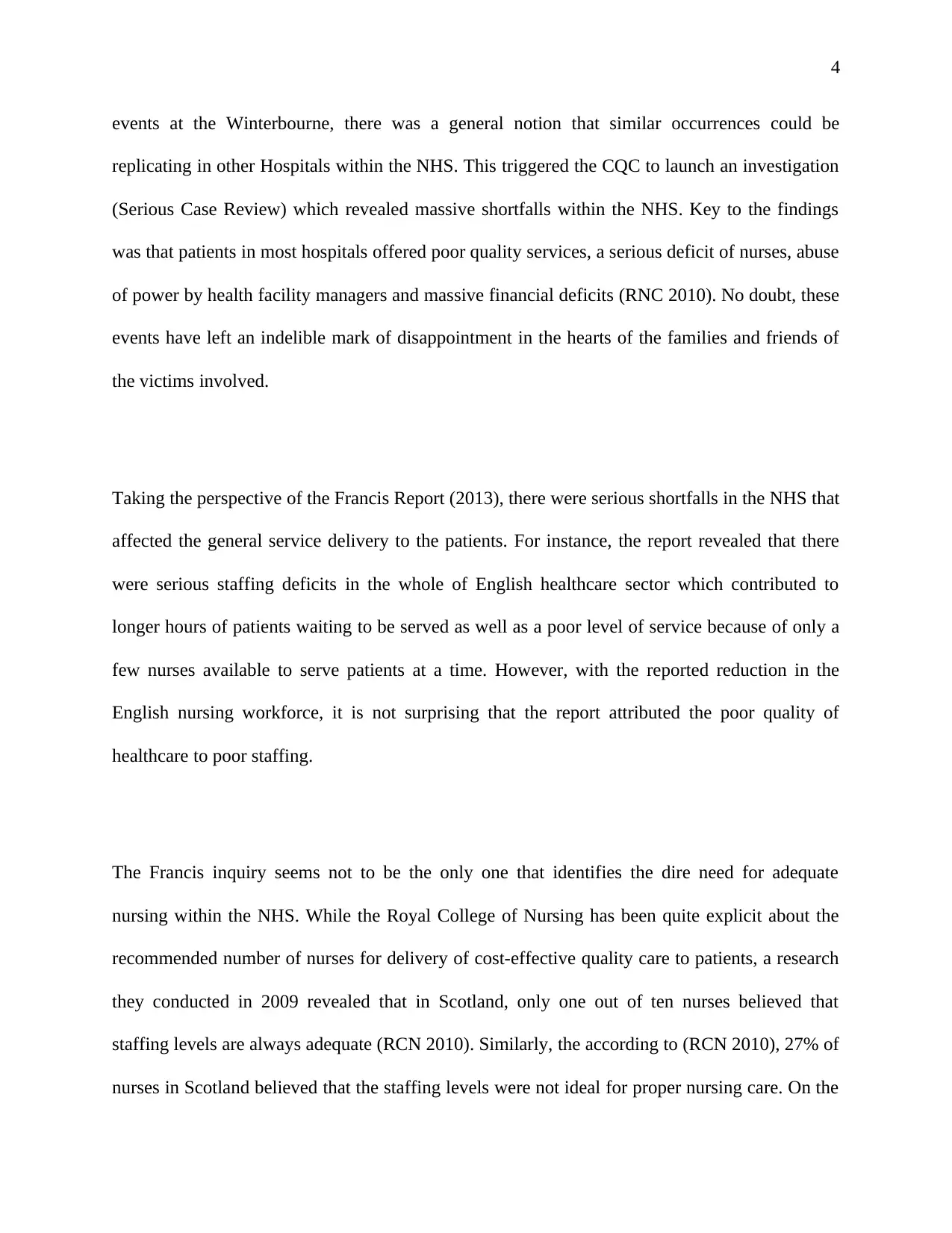
4
events at the Winterbourne, there was a general notion that similar occurrences could be
replicating in other Hospitals within the NHS. This triggered the CQC to launch an investigation
(Serious Case Review) which revealed massive shortfalls within the NHS. Key to the findings
was that patients in most hospitals offered poor quality services, a serious deficit of nurses, abuse
of power by health facility managers and massive financial deficits (RNC 2010). No doubt, these
events have left an indelible mark of disappointment in the hearts of the families and friends of
the victims involved.
Taking the perspective of the Francis Report (2013), there were serious shortfalls in the NHS that
affected the general service delivery to the patients. For instance, the report revealed that there
were serious staffing deficits in the whole of English healthcare sector which contributed to
longer hours of patients waiting to be served as well as a poor level of service because of only a
few nurses available to serve patients at a time. However, with the reported reduction in the
English nursing workforce, it is not surprising that the report attributed the poor quality of
healthcare to poor staffing.
The Francis inquiry seems not to be the only one that identifies the dire need for adequate
nursing within the NHS. While the Royal College of Nursing has been quite explicit about the
recommended number of nurses for delivery of cost-effective quality care to patients, a research
they conducted in 2009 revealed that in Scotland, only one out of ten nurses believed that
staffing levels are always adequate (RCN 2010). Similarly, the according to (RCN 2010), 27% of
nurses in Scotland believed that the staffing levels were not ideal for proper nursing care. On the
events at the Winterbourne, there was a general notion that similar occurrences could be
replicating in other Hospitals within the NHS. This triggered the CQC to launch an investigation
(Serious Case Review) which revealed massive shortfalls within the NHS. Key to the findings
was that patients in most hospitals offered poor quality services, a serious deficit of nurses, abuse
of power by health facility managers and massive financial deficits (RNC 2010). No doubt, these
events have left an indelible mark of disappointment in the hearts of the families and friends of
the victims involved.
Taking the perspective of the Francis Report (2013), there were serious shortfalls in the NHS that
affected the general service delivery to the patients. For instance, the report revealed that there
were serious staffing deficits in the whole of English healthcare sector which contributed to
longer hours of patients waiting to be served as well as a poor level of service because of only a
few nurses available to serve patients at a time. However, with the reported reduction in the
English nursing workforce, it is not surprising that the report attributed the poor quality of
healthcare to poor staffing.
The Francis inquiry seems not to be the only one that identifies the dire need for adequate
nursing within the NHS. While the Royal College of Nursing has been quite explicit about the
recommended number of nurses for delivery of cost-effective quality care to patients, a research
they conducted in 2009 revealed that in Scotland, only one out of ten nurses believed that
staffing levels are always adequate (RCN 2010). Similarly, the according to (RCN 2010), 27% of
nurses in Scotland believed that the staffing levels were not ideal for proper nursing care. On the
Paraphrase This Document
Need a fresh take? Get an instant paraphrase of this document with our AI Paraphraser
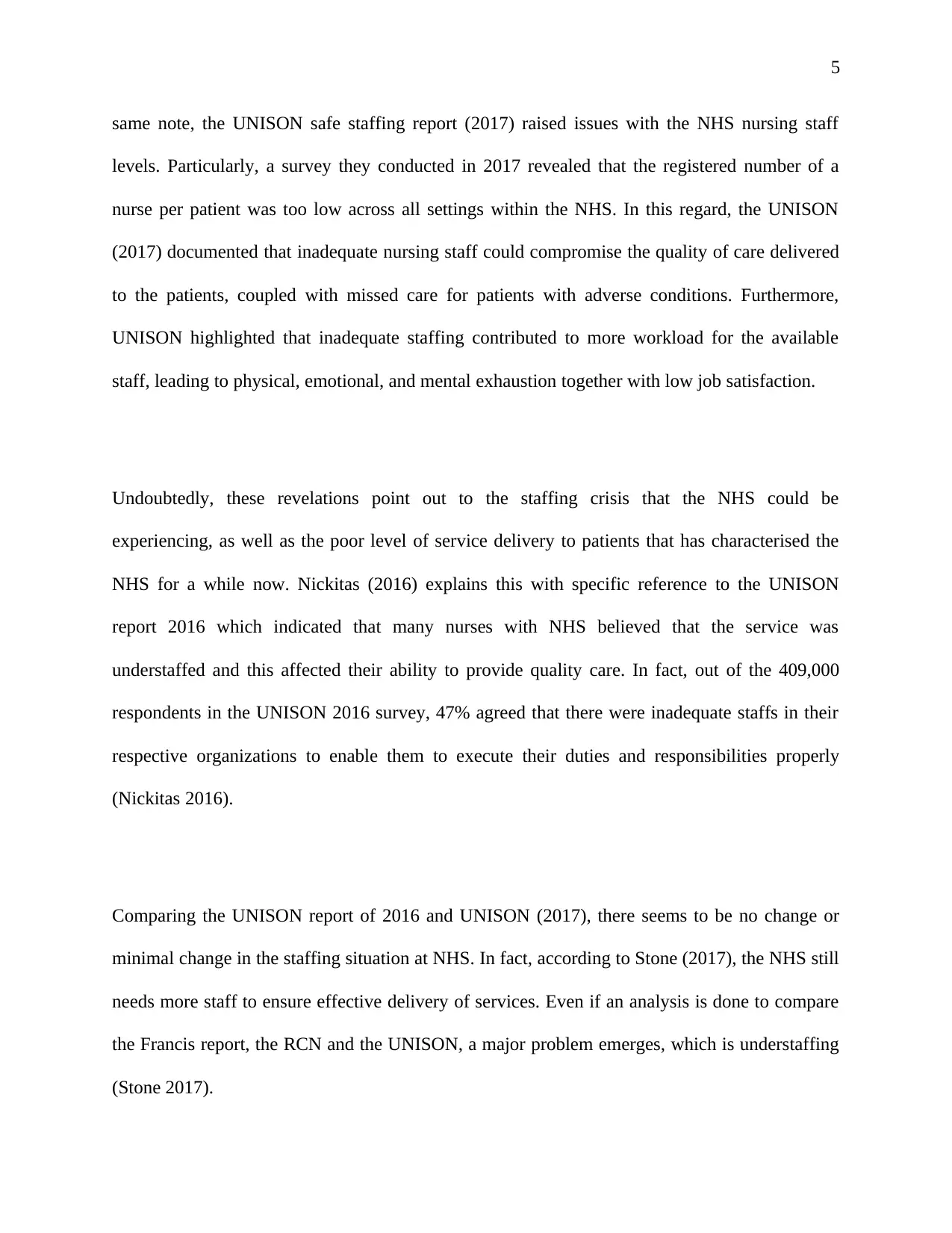
5
same note, the UNISON safe staffing report (2017) raised issues with the NHS nursing staff
levels. Particularly, a survey they conducted in 2017 revealed that the registered number of a
nurse per patient was too low across all settings within the NHS. In this regard, the UNISON
(2017) documented that inadequate nursing staff could compromise the quality of care delivered
to the patients, coupled with missed care for patients with adverse conditions. Furthermore,
UNISON highlighted that inadequate staffing contributed to more workload for the available
staff, leading to physical, emotional, and mental exhaustion together with low job satisfaction.
Undoubtedly, these revelations point out to the staffing crisis that the NHS could be
experiencing, as well as the poor level of service delivery to patients that has characterised the
NHS for a while now. Nickitas (2016) explains this with specific reference to the UNISON
report 2016 which indicated that many nurses with NHS believed that the service was
understaffed and this affected their ability to provide quality care. In fact, out of the 409,000
respondents in the UNISON 2016 survey, 47% agreed that there were inadequate staffs in their
respective organizations to enable them to execute their duties and responsibilities properly
(Nickitas 2016).
Comparing the UNISON report of 2016 and UNISON (2017), there seems to be no change or
minimal change in the staffing situation at NHS. In fact, according to Stone (2017), the NHS still
needs more staff to ensure effective delivery of services. Even if an analysis is done to compare
the Francis report, the RCN and the UNISON, a major problem emerges, which is understaffing
(Stone 2017).
same note, the UNISON safe staffing report (2017) raised issues with the NHS nursing staff
levels. Particularly, a survey they conducted in 2017 revealed that the registered number of a
nurse per patient was too low across all settings within the NHS. In this regard, the UNISON
(2017) documented that inadequate nursing staff could compromise the quality of care delivered
to the patients, coupled with missed care for patients with adverse conditions. Furthermore,
UNISON highlighted that inadequate staffing contributed to more workload for the available
staff, leading to physical, emotional, and mental exhaustion together with low job satisfaction.
Undoubtedly, these revelations point out to the staffing crisis that the NHS could be
experiencing, as well as the poor level of service delivery to patients that has characterised the
NHS for a while now. Nickitas (2016) explains this with specific reference to the UNISON
report 2016 which indicated that many nurses with NHS believed that the service was
understaffed and this affected their ability to provide quality care. In fact, out of the 409,000
respondents in the UNISON 2016 survey, 47% agreed that there were inadequate staffs in their
respective organizations to enable them to execute their duties and responsibilities properly
(Nickitas 2016).
Comparing the UNISON report of 2016 and UNISON (2017), there seems to be no change or
minimal change in the staffing situation at NHS. In fact, according to Stone (2017), the NHS still
needs more staff to ensure effective delivery of services. Even if an analysis is done to compare
the Francis report, the RCN and the UNISON, a major problem emerges, which is understaffing
(Stone 2017).
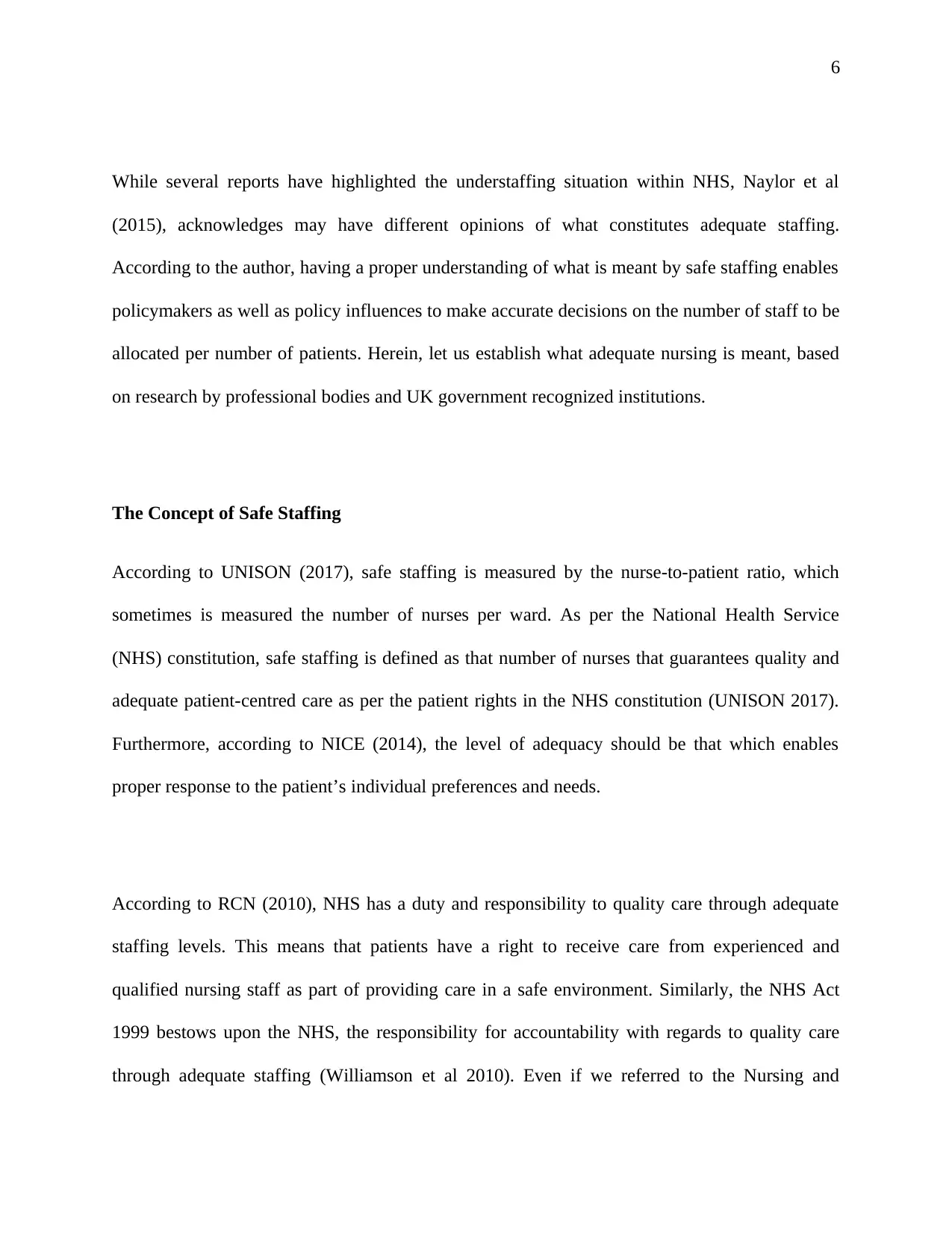
6
While several reports have highlighted the understaffing situation within NHS, Naylor et al
(2015), acknowledges may have different opinions of what constitutes adequate staffing.
According to the author, having a proper understanding of what is meant by safe staffing enables
policymakers as well as policy influences to make accurate decisions on the number of staff to be
allocated per number of patients. Herein, let us establish what adequate nursing is meant, based
on research by professional bodies and UK government recognized institutions.
The Concept of Safe Staffing
According to UNISON (2017), safe staffing is measured by the nurse-to-patient ratio, which
sometimes is measured the number of nurses per ward. As per the National Health Service
(NHS) constitution, safe staffing is defined as that number of nurses that guarantees quality and
adequate patient-centred care as per the patient rights in the NHS constitution (UNISON 2017).
Furthermore, according to NICE (2014), the level of adequacy should be that which enables
proper response to the patient’s individual preferences and needs.
According to RCN (2010), NHS has a duty and responsibility to quality care through adequate
staffing levels. This means that patients have a right to receive care from experienced and
qualified nursing staff as part of providing care in a safe environment. Similarly, the NHS Act
1999 bestows upon the NHS, the responsibility for accountability with regards to quality care
through adequate staffing (Williamson et al 2010). Even if we referred to the Nursing and
While several reports have highlighted the understaffing situation within NHS, Naylor et al
(2015), acknowledges may have different opinions of what constitutes adequate staffing.
According to the author, having a proper understanding of what is meant by safe staffing enables
policymakers as well as policy influences to make accurate decisions on the number of staff to be
allocated per number of patients. Herein, let us establish what adequate nursing is meant, based
on research by professional bodies and UK government recognized institutions.
The Concept of Safe Staffing
According to UNISON (2017), safe staffing is measured by the nurse-to-patient ratio, which
sometimes is measured the number of nurses per ward. As per the National Health Service
(NHS) constitution, safe staffing is defined as that number of nurses that guarantees quality and
adequate patient-centred care as per the patient rights in the NHS constitution (UNISON 2017).
Furthermore, according to NICE (2014), the level of adequacy should be that which enables
proper response to the patient’s individual preferences and needs.
According to RCN (2010), NHS has a duty and responsibility to quality care through adequate
staffing levels. This means that patients have a right to receive care from experienced and
qualified nursing staff as part of providing care in a safe environment. Similarly, the NHS Act
1999 bestows upon the NHS, the responsibility for accountability with regards to quality care
through adequate staffing (Williamson et al 2010). Even if we referred to the Nursing and
⊘ This is a preview!⊘
Do you want full access?
Subscribe today to unlock all pages.

Trusted by 1+ million students worldwide
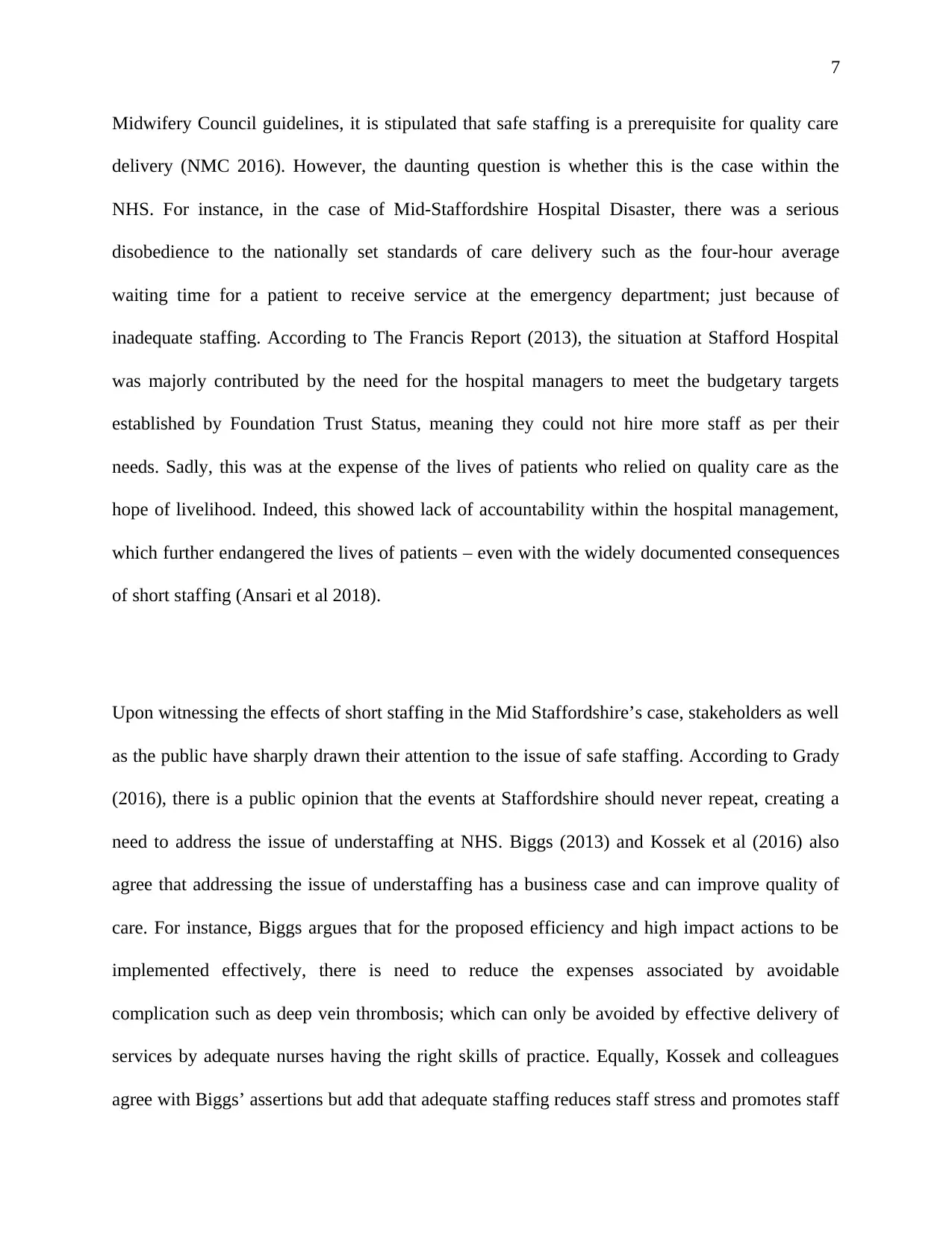
7
Midwifery Council guidelines, it is stipulated that safe staffing is a prerequisite for quality care
delivery (NMC 2016). However, the daunting question is whether this is the case within the
NHS. For instance, in the case of Mid-Staffordshire Hospital Disaster, there was a serious
disobedience to the nationally set standards of care delivery such as the four-hour average
waiting time for a patient to receive service at the emergency department; just because of
inadequate staffing. According to The Francis Report (2013), the situation at Stafford Hospital
was majorly contributed by the need for the hospital managers to meet the budgetary targets
established by Foundation Trust Status, meaning they could not hire more staff as per their
needs. Sadly, this was at the expense of the lives of patients who relied on quality care as the
hope of livelihood. Indeed, this showed lack of accountability within the hospital management,
which further endangered the lives of patients – even with the widely documented consequences
of short staffing (Ansari et al 2018).
Upon witnessing the effects of short staffing in the Mid Staffordshire’s case, stakeholders as well
as the public have sharply drawn their attention to the issue of safe staffing. According to Grady
(2016), there is a public opinion that the events at Staffordshire should never repeat, creating a
need to address the issue of understaffing at NHS. Biggs (2013) and Kossek et al (2016) also
agree that addressing the issue of understaffing has a business case and can improve quality of
care. For instance, Biggs argues that for the proposed efficiency and high impact actions to be
implemented effectively, there is need to reduce the expenses associated by avoidable
complication such as deep vein thrombosis; which can only be avoided by effective delivery of
services by adequate nurses having the right skills of practice. Equally, Kossek and colleagues
agree with Biggs’ assertions but add that adequate staffing reduces staff stress and promotes staff
Midwifery Council guidelines, it is stipulated that safe staffing is a prerequisite for quality care
delivery (NMC 2016). However, the daunting question is whether this is the case within the
NHS. For instance, in the case of Mid-Staffordshire Hospital Disaster, there was a serious
disobedience to the nationally set standards of care delivery such as the four-hour average
waiting time for a patient to receive service at the emergency department; just because of
inadequate staffing. According to The Francis Report (2013), the situation at Stafford Hospital
was majorly contributed by the need for the hospital managers to meet the budgetary targets
established by Foundation Trust Status, meaning they could not hire more staff as per their
needs. Sadly, this was at the expense of the lives of patients who relied on quality care as the
hope of livelihood. Indeed, this showed lack of accountability within the hospital management,
which further endangered the lives of patients – even with the widely documented consequences
of short staffing (Ansari et al 2018).
Upon witnessing the effects of short staffing in the Mid Staffordshire’s case, stakeholders as well
as the public have sharply drawn their attention to the issue of safe staffing. According to Grady
(2016), there is a public opinion that the events at Staffordshire should never repeat, creating a
need to address the issue of understaffing at NHS. Biggs (2013) and Kossek et al (2016) also
agree that addressing the issue of understaffing has a business case and can improve quality of
care. For instance, Biggs argues that for the proposed efficiency and high impact actions to be
implemented effectively, there is need to reduce the expenses associated by avoidable
complication such as deep vein thrombosis; which can only be avoided by effective delivery of
services by adequate nurses having the right skills of practice. Equally, Kossek and colleagues
agree with Biggs’ assertions but add that adequate staffing reduces staff stress and promotes staff
Paraphrase This Document
Need a fresh take? Get an instant paraphrase of this document with our AI Paraphraser
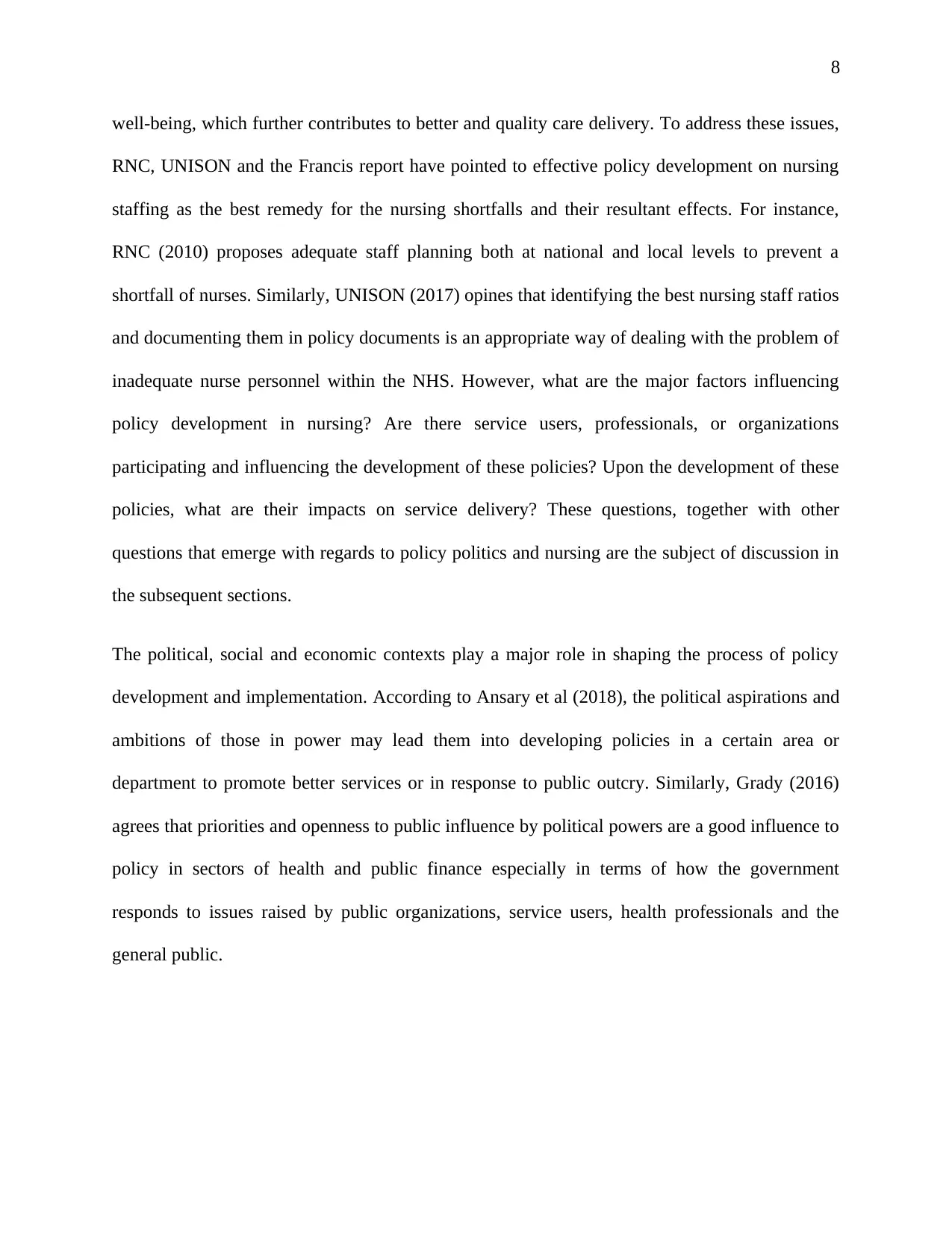
8
well-being, which further contributes to better and quality care delivery. To address these issues,
RNC, UNISON and the Francis report have pointed to effective policy development on nursing
staffing as the best remedy for the nursing shortfalls and their resultant effects. For instance,
RNC (2010) proposes adequate staff planning both at national and local levels to prevent a
shortfall of nurses. Similarly, UNISON (2017) opines that identifying the best nursing staff ratios
and documenting them in policy documents is an appropriate way of dealing with the problem of
inadequate nurse personnel within the NHS. However, what are the major factors influencing
policy development in nursing? Are there service users, professionals, or organizations
participating and influencing the development of these policies? Upon the development of these
policies, what are their impacts on service delivery? These questions, together with other
questions that emerge with regards to policy politics and nursing are the subject of discussion in
the subsequent sections.
The political, social and economic contexts play a major role in shaping the process of policy
development and implementation. According to Ansary et al (2018), the political aspirations and
ambitions of those in power may lead them into developing policies in a certain area or
department to promote better services or in response to public outcry. Similarly, Grady (2016)
agrees that priorities and openness to public influence by political powers are a good influence to
policy in sectors of health and public finance especially in terms of how the government
responds to issues raised by public organizations, service users, health professionals and the
general public.
well-being, which further contributes to better and quality care delivery. To address these issues,
RNC, UNISON and the Francis report have pointed to effective policy development on nursing
staffing as the best remedy for the nursing shortfalls and their resultant effects. For instance,
RNC (2010) proposes adequate staff planning both at national and local levels to prevent a
shortfall of nurses. Similarly, UNISON (2017) opines that identifying the best nursing staff ratios
and documenting them in policy documents is an appropriate way of dealing with the problem of
inadequate nurse personnel within the NHS. However, what are the major factors influencing
policy development in nursing? Are there service users, professionals, or organizations
participating and influencing the development of these policies? Upon the development of these
policies, what are their impacts on service delivery? These questions, together with other
questions that emerge with regards to policy politics and nursing are the subject of discussion in
the subsequent sections.
The political, social and economic contexts play a major role in shaping the process of policy
development and implementation. According to Ansary et al (2018), the political aspirations and
ambitions of those in power may lead them into developing policies in a certain area or
department to promote better services or in response to public outcry. Similarly, Grady (2016)
agrees that priorities and openness to public influence by political powers are a good influence to
policy in sectors of health and public finance especially in terms of how the government
responds to issues raised by public organizations, service users, health professionals and the
general public.
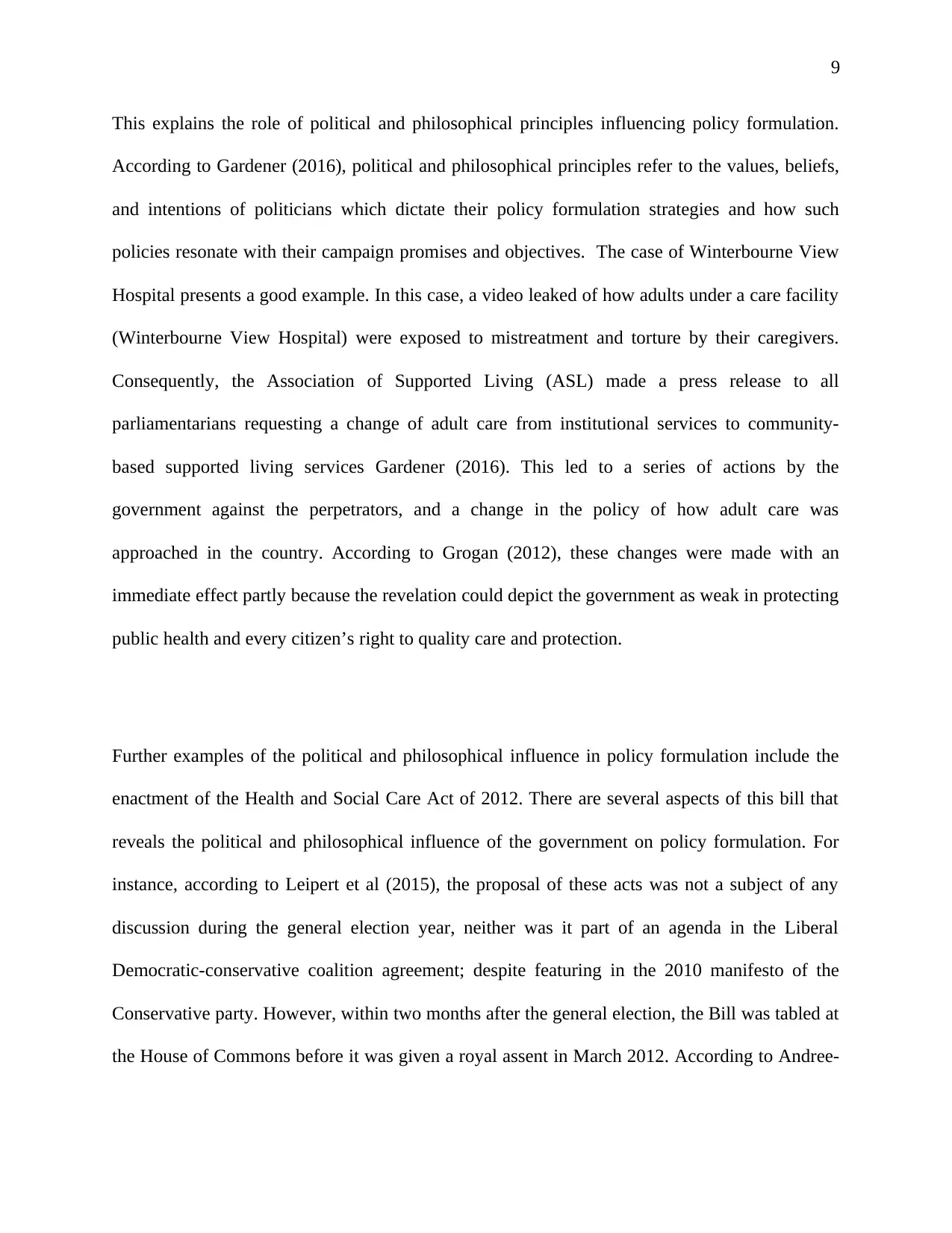
9
This explains the role of political and philosophical principles influencing policy formulation.
According to Gardener (2016), political and philosophical principles refer to the values, beliefs,
and intentions of politicians which dictate their policy formulation strategies and how such
policies resonate with their campaign promises and objectives. The case of Winterbourne View
Hospital presents a good example. In this case, a video leaked of how adults under a care facility
(Winterbourne View Hospital) were exposed to mistreatment and torture by their caregivers.
Consequently, the Association of Supported Living (ASL) made a press release to all
parliamentarians requesting a change of adult care from institutional services to community-
based supported living services Gardener (2016). This led to a series of actions by the
government against the perpetrators, and a change in the policy of how adult care was
approached in the country. According to Grogan (2012), these changes were made with an
immediate effect partly because the revelation could depict the government as weak in protecting
public health and every citizen’s right to quality care and protection.
Further examples of the political and philosophical influence in policy formulation include the
enactment of the Health and Social Care Act of 2012. There are several aspects of this bill that
reveals the political and philosophical influence of the government on policy formulation. For
instance, according to Leipert et al (2015), the proposal of these acts was not a subject of any
discussion during the general election year, neither was it part of an agenda in the Liberal
Democratic-conservative coalition agreement; despite featuring in the 2010 manifesto of the
Conservative party. However, within two months after the general election, the Bill was tabled at
the House of Commons before it was given a royal assent in March 2012. According to Andree-
This explains the role of political and philosophical principles influencing policy formulation.
According to Gardener (2016), political and philosophical principles refer to the values, beliefs,
and intentions of politicians which dictate their policy formulation strategies and how such
policies resonate with their campaign promises and objectives. The case of Winterbourne View
Hospital presents a good example. In this case, a video leaked of how adults under a care facility
(Winterbourne View Hospital) were exposed to mistreatment and torture by their caregivers.
Consequently, the Association of Supported Living (ASL) made a press release to all
parliamentarians requesting a change of adult care from institutional services to community-
based supported living services Gardener (2016). This led to a series of actions by the
government against the perpetrators, and a change in the policy of how adult care was
approached in the country. According to Grogan (2012), these changes were made with an
immediate effect partly because the revelation could depict the government as weak in protecting
public health and every citizen’s right to quality care and protection.
Further examples of the political and philosophical influence in policy formulation include the
enactment of the Health and Social Care Act of 2012. There are several aspects of this bill that
reveals the political and philosophical influence of the government on policy formulation. For
instance, according to Leipert et al (2015), the proposal of these acts was not a subject of any
discussion during the general election year, neither was it part of an agenda in the Liberal
Democratic-conservative coalition agreement; despite featuring in the 2010 manifesto of the
Conservative party. However, within two months after the general election, the Bill was tabled at
the House of Commons before it was given a royal assent in March 2012. According to Andree-
⊘ This is a preview!⊘
Do you want full access?
Subscribe today to unlock all pages.

Trusted by 1+ million students worldwide
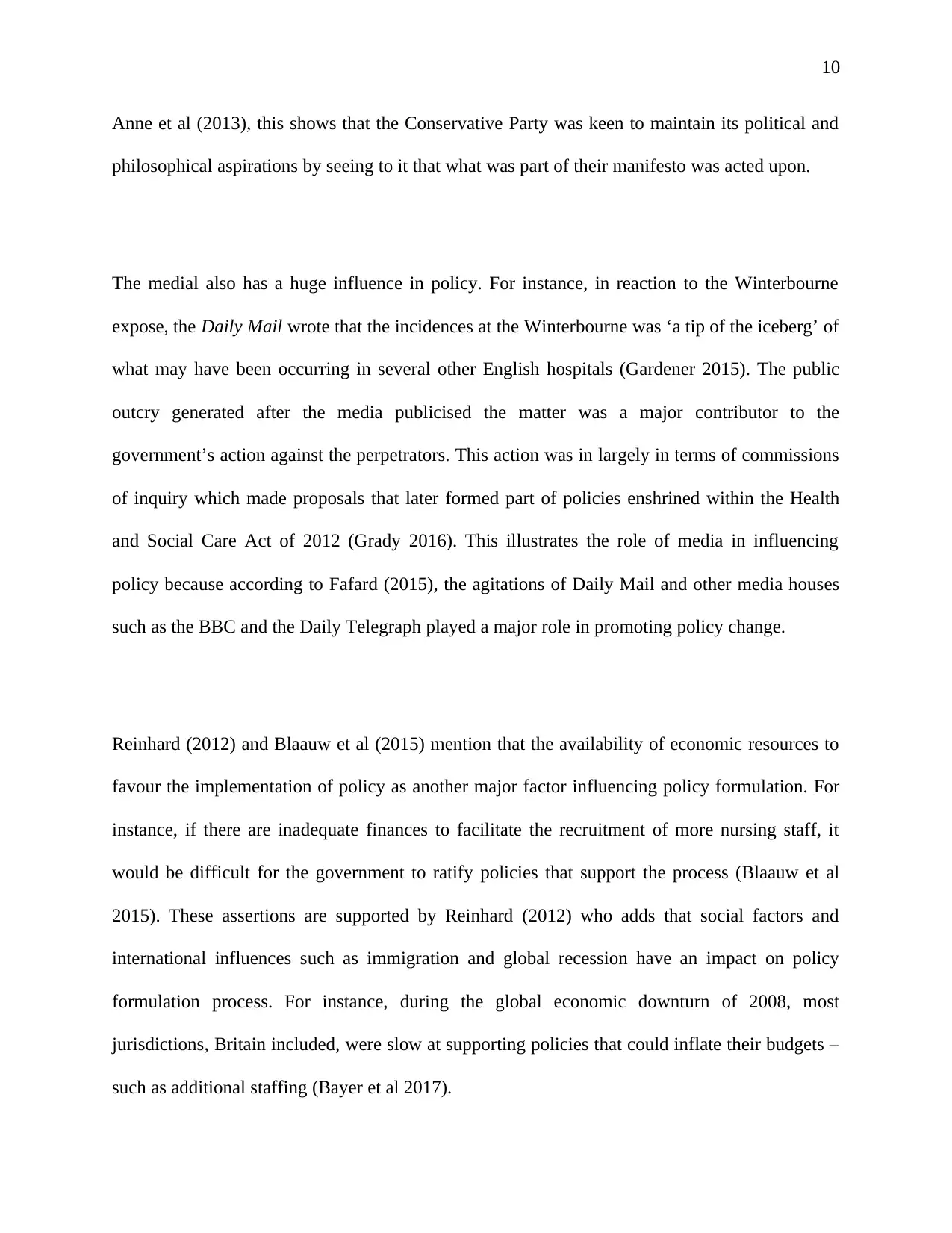
10
Anne et al (2013), this shows that the Conservative Party was keen to maintain its political and
philosophical aspirations by seeing to it that what was part of their manifesto was acted upon.
The medial also has a huge influence in policy. For instance, in reaction to the Winterbourne
expose, the Daily Mail wrote that the incidences at the Winterbourne was ‘a tip of the iceberg’ of
what may have been occurring in several other English hospitals (Gardener 2015). The public
outcry generated after the media publicised the matter was a major contributor to the
government’s action against the perpetrators. This action was in largely in terms of commissions
of inquiry which made proposals that later formed part of policies enshrined within the Health
and Social Care Act of 2012 (Grady 2016). This illustrates the role of media in influencing
policy because according to Fafard (2015), the agitations of Daily Mail and other media houses
such as the BBC and the Daily Telegraph played a major role in promoting policy change.
Reinhard (2012) and Blaauw et al (2015) mention that the availability of economic resources to
favour the implementation of policy as another major factor influencing policy formulation. For
instance, if there are inadequate finances to facilitate the recruitment of more nursing staff, it
would be difficult for the government to ratify policies that support the process (Blaauw et al
2015). These assertions are supported by Reinhard (2012) who adds that social factors and
international influences such as immigration and global recession have an impact on policy
formulation process. For instance, during the global economic downturn of 2008, most
jurisdictions, Britain included, were slow at supporting policies that could inflate their budgets –
such as additional staffing (Bayer et al 2017).
Anne et al (2013), this shows that the Conservative Party was keen to maintain its political and
philosophical aspirations by seeing to it that what was part of their manifesto was acted upon.
The medial also has a huge influence in policy. For instance, in reaction to the Winterbourne
expose, the Daily Mail wrote that the incidences at the Winterbourne was ‘a tip of the iceberg’ of
what may have been occurring in several other English hospitals (Gardener 2015). The public
outcry generated after the media publicised the matter was a major contributor to the
government’s action against the perpetrators. This action was in largely in terms of commissions
of inquiry which made proposals that later formed part of policies enshrined within the Health
and Social Care Act of 2012 (Grady 2016). This illustrates the role of media in influencing
policy because according to Fafard (2015), the agitations of Daily Mail and other media houses
such as the BBC and the Daily Telegraph played a major role in promoting policy change.
Reinhard (2012) and Blaauw et al (2015) mention that the availability of economic resources to
favour the implementation of policy as another major factor influencing policy formulation. For
instance, if there are inadequate finances to facilitate the recruitment of more nursing staff, it
would be difficult for the government to ratify policies that support the process (Blaauw et al
2015). These assertions are supported by Reinhard (2012) who adds that social factors and
international influences such as immigration and global recession have an impact on policy
formulation process. For instance, during the global economic downturn of 2008, most
jurisdictions, Britain included, were slow at supporting policies that could inflate their budgets –
such as additional staffing (Bayer et al 2017).
Paraphrase This Document
Need a fresh take? Get an instant paraphrase of this document with our AI Paraphraser
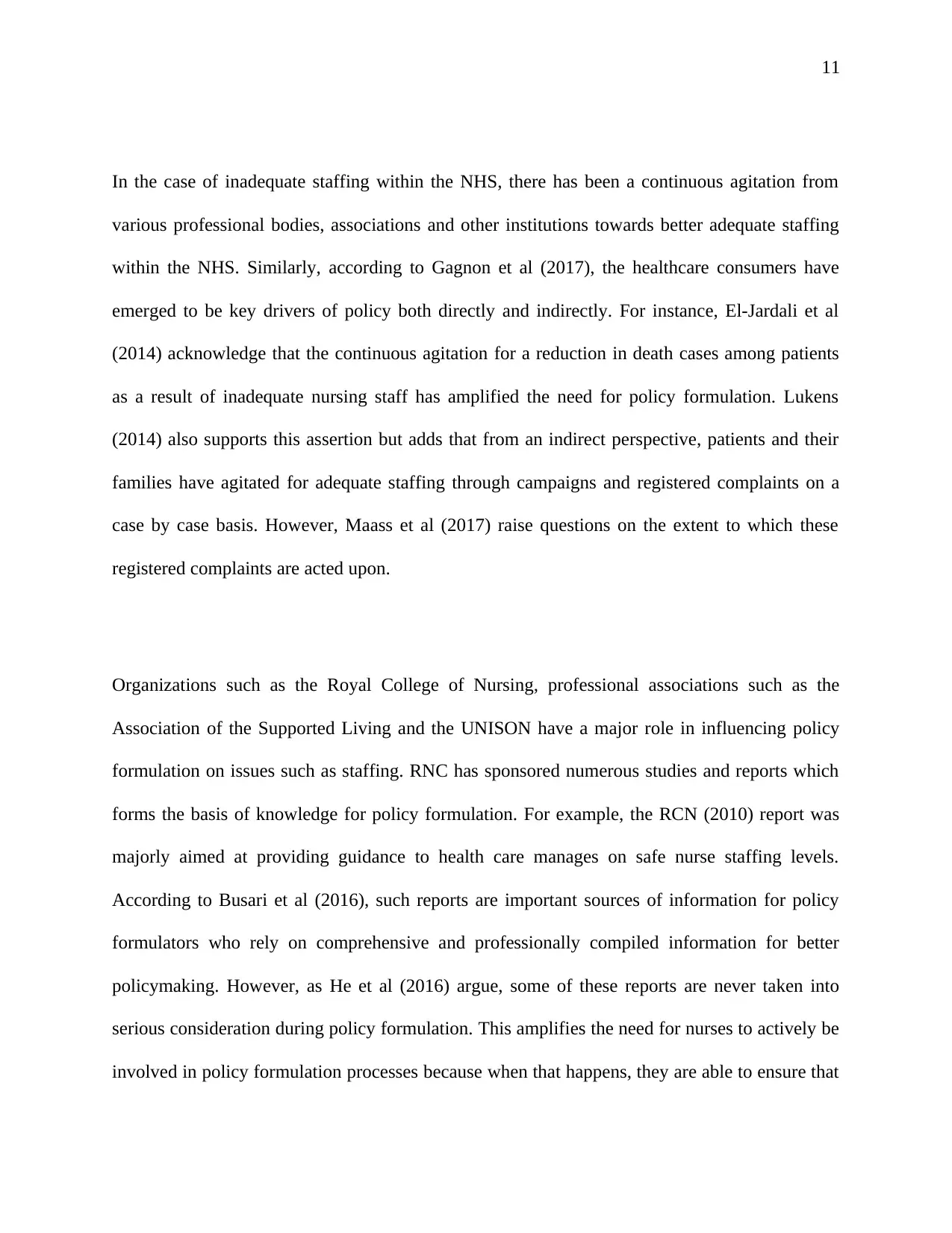
11
In the case of inadequate staffing within the NHS, there has been a continuous agitation from
various professional bodies, associations and other institutions towards better adequate staffing
within the NHS. Similarly, according to Gagnon et al (2017), the healthcare consumers have
emerged to be key drivers of policy both directly and indirectly. For instance, El-Jardali et al
(2014) acknowledge that the continuous agitation for a reduction in death cases among patients
as a result of inadequate nursing staff has amplified the need for policy formulation. Lukens
(2014) also supports this assertion but adds that from an indirect perspective, patients and their
families have agitated for adequate staffing through campaigns and registered complaints on a
case by case basis. However, Maass et al (2017) raise questions on the extent to which these
registered complaints are acted upon.
Organizations such as the Royal College of Nursing, professional associations such as the
Association of the Supported Living and the UNISON have a major role in influencing policy
formulation on issues such as staffing. RNC has sponsored numerous studies and reports which
forms the basis of knowledge for policy formulation. For example, the RCN (2010) report was
majorly aimed at providing guidance to health care manages on safe nurse staffing levels.
According to Busari et al (2016), such reports are important sources of information for policy
formulators who rely on comprehensive and professionally compiled information for better
policymaking. However, as He et al (2016) argue, some of these reports are never taken into
serious consideration during policy formulation. This amplifies the need for nurses to actively be
involved in policy formulation processes because when that happens, they are able to ensure that
In the case of inadequate staffing within the NHS, there has been a continuous agitation from
various professional bodies, associations and other institutions towards better adequate staffing
within the NHS. Similarly, according to Gagnon et al (2017), the healthcare consumers have
emerged to be key drivers of policy both directly and indirectly. For instance, El-Jardali et al
(2014) acknowledge that the continuous agitation for a reduction in death cases among patients
as a result of inadequate nursing staff has amplified the need for policy formulation. Lukens
(2014) also supports this assertion but adds that from an indirect perspective, patients and their
families have agitated for adequate staffing through campaigns and registered complaints on a
case by case basis. However, Maass et al (2017) raise questions on the extent to which these
registered complaints are acted upon.
Organizations such as the Royal College of Nursing, professional associations such as the
Association of the Supported Living and the UNISON have a major role in influencing policy
formulation on issues such as staffing. RNC has sponsored numerous studies and reports which
forms the basis of knowledge for policy formulation. For example, the RCN (2010) report was
majorly aimed at providing guidance to health care manages on safe nurse staffing levels.
According to Busari et al (2016), such reports are important sources of information for policy
formulators who rely on comprehensive and professionally compiled information for better
policymaking. However, as He et al (2016) argue, some of these reports are never taken into
serious consideration during policy formulation. This amplifies the need for nurses to actively be
involved in policy formulation processes because when that happens, they are able to ensure that
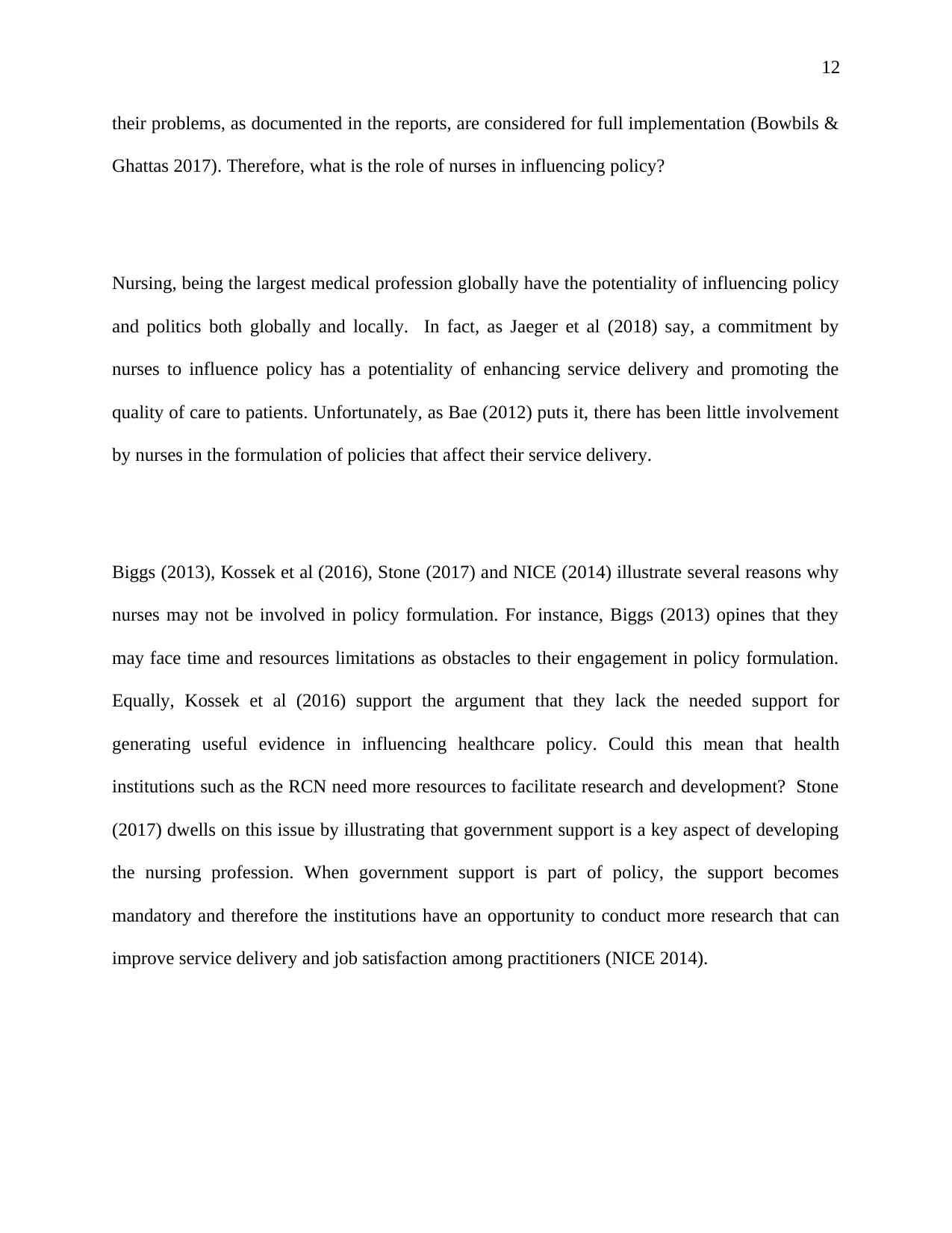
12
their problems, as documented in the reports, are considered for full implementation (Bowbils &
Ghattas 2017). Therefore, what is the role of nurses in influencing policy?
Nursing, being the largest medical profession globally have the potentiality of influencing policy
and politics both globally and locally. In fact, as Jaeger et al (2018) say, a commitment by
nurses to influence policy has a potentiality of enhancing service delivery and promoting the
quality of care to patients. Unfortunately, as Bae (2012) puts it, there has been little involvement
by nurses in the formulation of policies that affect their service delivery.
Biggs (2013), Kossek et al (2016), Stone (2017) and NICE (2014) illustrate several reasons why
nurses may not be involved in policy formulation. For instance, Biggs (2013) opines that they
may face time and resources limitations as obstacles to their engagement in policy formulation.
Equally, Kossek et al (2016) support the argument that they lack the needed support for
generating useful evidence in influencing healthcare policy. Could this mean that health
institutions such as the RCN need more resources to facilitate research and development? Stone
(2017) dwells on this issue by illustrating that government support is a key aspect of developing
the nursing profession. When government support is part of policy, the support becomes
mandatory and therefore the institutions have an opportunity to conduct more research that can
improve service delivery and job satisfaction among practitioners (NICE 2014).
their problems, as documented in the reports, are considered for full implementation (Bowbils &
Ghattas 2017). Therefore, what is the role of nurses in influencing policy?
Nursing, being the largest medical profession globally have the potentiality of influencing policy
and politics both globally and locally. In fact, as Jaeger et al (2018) say, a commitment by
nurses to influence policy has a potentiality of enhancing service delivery and promoting the
quality of care to patients. Unfortunately, as Bae (2012) puts it, there has been little involvement
by nurses in the formulation of policies that affect their service delivery.
Biggs (2013), Kossek et al (2016), Stone (2017) and NICE (2014) illustrate several reasons why
nurses may not be involved in policy formulation. For instance, Biggs (2013) opines that they
may face time and resources limitations as obstacles to their engagement in policy formulation.
Equally, Kossek et al (2016) support the argument that they lack the needed support for
generating useful evidence in influencing healthcare policy. Could this mean that health
institutions such as the RCN need more resources to facilitate research and development? Stone
(2017) dwells on this issue by illustrating that government support is a key aspect of developing
the nursing profession. When government support is part of policy, the support becomes
mandatory and therefore the institutions have an opportunity to conduct more research that can
improve service delivery and job satisfaction among practitioners (NICE 2014).
⊘ This is a preview!⊘
Do you want full access?
Subscribe today to unlock all pages.

Trusted by 1+ million students worldwide
1 out of 19
Your All-in-One AI-Powered Toolkit for Academic Success.
+13062052269
info@desklib.com
Available 24*7 on WhatsApp / Email
![[object Object]](/_next/static/media/star-bottom.7253800d.svg)
Unlock your academic potential
Copyright © 2020–2026 A2Z Services. All Rights Reserved. Developed and managed by ZUCOL.

